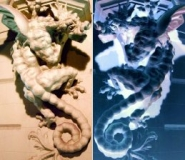Conveners
Parallel Session B. P, T, CPT symmetries, Lorentz violation and Decoherence-I
- Antonio DI DOMENICO (Universita' di Roma & INFN sez. di Roma)
Ralf Lehnert
(Max-Planck-Institut fuer Physik)
12/12/2008, 15:00
CPT in Quantum Gravity and String Theory, Decoherence, Lorentz Violation
Minuscule deviations from CPT and Lorentz symmetry can arise in a number of theoretical approaches to quantum gravity. This opens an avenue for probing fundamental physics possibly arising at the Planck scale. We list some theoretical ideas along these lines. We further review Standard-Model Extension (SME), which describes the emergent low-energy effects. In the context of the SME, we discuss...
Prof.
Eberhard Widmann
(Stefan Meyer Institute)
12/12/2008, 15:25
CPT in Quantum Gravity and String Theory, Decoherence, Lorentz Violation
Recent progress in the laser and microwave spectroscopy of antiprotonic helium atoms carried out at CERN’s Antiproton Decelerator facility (AD) will be reviewed. Laser transitions were induced between Rydberg states of the exotic three-body system antiproton-electron-alpha particle. Successive refinements in the experimental techniques improved the fractional precision on the transition...
Dr
Bertalan Juhasz
(Stefan Meyer Institute for Subatomic Physics)
12/12/2008, 15:50
CPT in Quantum Gravity and String Theory, Decoherence, Lorentz Violation
The hydrogen atom is one of the most extensively studied atomic systems, and its ground state hyperfine splitting (GS-HFS) at 1.42 GHz has been measured with an extremely high precision of 10^-12. Therefore the antimatter counterpart of hydrogen, the antihydrogen atom, consisting of an antiproton and a positron, is an ideal laboratory for studying the CPT symmetry.
V.A. Kostelecky and his...
Alberto Lusiani
(Representative from the Babar collaboration)
12/12/2008, 16:15
Time Reversal
We present tests of T and CPT symmetries from the asymmetric-energy
B factories (Babar and Belle). We report the results of constraints
on the CPT violation parameter z in B0 - B0bar flavor oscillations.
Results integrated over time and as a function of the Earth's sidereal
time are presented using inclusive dilepton events. Constraints
on z from a joint analysis of CP...
Dr
Alexandre Sakharov
(CERN, ETHZ)
12/12/2008, 16:40
CPT in Quantum Gravity and String Theory, Decoherence, Lorentz Violation
We discuss effects suggested to be induced in the neutrino physics by
models of quantum gravity. In particular, quantum decoherence can lead to fewer
neutrinos of all active flavours being detected in a long baseline experiments
as compared to three-flavour standard neutrino oscillations. We discuss the
potential of CNGS and J-PARC beams in constraining models of quantum gravity
induced...
